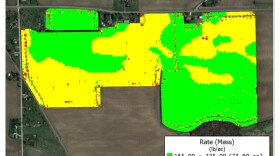In 1920, there were 5.5 million white farm operators. By 2007, that number was down to 2.1 million. That's not all that surprising given that many white farmers are able to own and farm more acres because of today’s machinery.
Now, let's look at a different set of numbers. In 1920, there were 926,000 black farm operators. By 2007, the number was just over 30,000. That is a much steeper decrease, just one thirtieth of the original number.
Shakara Tyler, a PhD candidate at Michigan State University, reported these numbers in her paper “Plight of Black Farmers in the Context of USDA Farm Loan Programs: A Research Agenda for the Future.” It was published in the Professional Agricultural Journal.
Tyler works as an underserved farmer development specialist at MSU’s Center for Regional Food Systems, and she joined Stateside to explain how undeserved farmers are not getting their fair share of government resources.
“The farm loan officer always found something wrong with the application, so they had to complete it again and again and again,” Tyler said. “Black farmers, Latina farmers, indigenous farmers, and women farmers have all filed a lawsuit against the USDA in response to that discrimination.”
Tyler works as an advocate for underserved farmers. She assists them with paperwork and appointments at USDA offices, and connects them with philanthropies that can provide grant funding to their farms.
Tyler noted that the USDA is very decentralized and that USDA employees are often not held accountable when it comes to actually helping the farmers.
A 1982 study by the U.S. Civil Rights Commission predicted black farmers would be non-existent by 2000 due to racial discrimination and other factors, including low representation on county agricultural committees and the dominating growth of agricultural business.
“It is no secret that land is power ..." Tyler said. "When farmers of colors have access to these resources, to basically be independent and be self-sufficient with their farm operations and to provide for their community, it threatens the system that thrives on those farmers depending on that system.”
"They don’t want the farmers [of color] to be successful with their farming businesses because that would go against the ideals of dependency and paternalism within the overall American agricultural system.”
Listen above for Stateside's full conversation with Shakara Tyler. You'll learn about legislation that is, and is not, working for underserved farmers, about shifts in the stigma associated with being a farmer in certain communities, and about policies that may change soon.
(Subscribe to the Stateside podcast on iTunes, Google Play, or with this RSS link)






